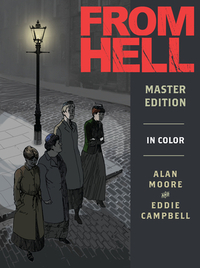Take a photo of a barcode or cover
Una novela atrapante de principio a fin, llena de simbolismos y sustento que con cada releída hará que notes algo nuevo.
Una radiografía de la sociedad londinense de ese entonces.
Completamente recomendado.
Una radiografía de la sociedad londinense de ese entonces.
Completamente recomendado.
dark
emotional
mysterious
tense
medium-paced
Plot or Character Driven:
A mix
Strong character development:
Complicated
Loveable characters:
No
Diverse cast of characters:
Complicated
Flaws of characters a main focus:
Yes
Fantastic graphic novel and probably my personal favorite conspiracy theory behind Jack the Ripper. I would love to write and draw a book like this one day.
This is an interesting view at all of the murders associated with Jack the Ripper and one theory of a massive conspiracy that ties into the murders.
My favorite aspect of the book may have actually been the appendices at the end. Alan Moore goes over the source material for what is happening in the story, and often will point out how credulous the evidence is or is not. I'd be rather curious to know what Moore's feelings on the subject are and whether he sees this as a work of fiction or not. One of the appendices also gets into the history of all the claims of people discovering the true identity of the serial killer. In many ways the story goes beyond the death of all the victims in 1888 and becomes a bit of a rumination on the obsession with violence, murder, and deranged killers, often to the detriment of understanding what perhaps might be more important.
The art was hit or miss. When the art was showing architectural elements it could be very good, and the scenes of violence often has a mesmerizing splattered effect like the gore was turning into a miasma that overruns the panels. However, the artwork on the characters was lacking. It was often hard to differentiate the individual characters based on the art, which is problematic to put it mildly.
My favorite aspect of the book may have actually been the appendices at the end. Alan Moore goes over the source material for what is happening in the story, and often will point out how credulous the evidence is or is not. I'd be rather curious to know what Moore's feelings on the subject are and whether he sees this as a work of fiction or not. One of the appendices also gets into the history of all the claims of people discovering the true identity of the serial killer. In many ways the story goes beyond the death of all the victims in 1888 and becomes a bit of a rumination on the obsession with violence, murder, and deranged killers, often to the detriment of understanding what perhaps might be more important.
The art was hit or miss. When the art was showing architectural elements it could be very good, and the scenes of violence often has a mesmerizing splattered effect like the gore was turning into a miasma that overruns the panels. However, the artwork on the characters was lacking. It was often hard to differentiate the individual characters based on the art, which is problematic to put it mildly.
dark
mysterious
slow-paced
Plot or Character Driven:
A mix
Strong character development:
Yes
Loveable characters:
Complicated
Diverse cast of characters:
No
Flaws of characters a main focus:
No
challenging
dark
mysterious
slow-paced
Plot or Character Driven:
A mix
Strong character development:
Yes
Loveable characters:
No
Diverse cast of characters:
No
Flaws of characters a main focus:
Yes
The Jack the Ripper mythos is, as Moore tells one in the appendix, so convoluted with theories as to be almost nonsense. From Hell is not an attempt to tell it like it was, but rather a piece of fiction in which Moore uses the murders as a way of channeling something much closer to Crime and Punishment: the psychology of a mass murderer. But, where as Dostoevsky's hero takes theory and alone makes it into murder, Moore's Dr.Gull is encouraged every step along the way. Instead of finding emptiness and guilt, he finds revelation. Tapping into a wealth of occult, psychology and history, Moore not only makes a more frightening and believable reflection of the “superman” with Napoleonic characteristics, but manages to create him as a personification of modernity's failure to bring about a Utopian world of science.
A++
A++
challenging
dark
sad
fast-paced
Plot or Character Driven:
Plot
Strong character development:
Complicated
Loveable characters:
No
Diverse cast of characters:
No
Flaws of characters a main focus:
No
Meh. I didn't really like Hawksmoor and I didn't really like this book. I guess I'm just not that into London murder conspiracies.
Sorry, but this sucks. I made it through the first five chapters, but I find it infuriating. It’s dedicated to the Ripper’s victims, but in terms of actions, it seems infatuated with the Ripper as a character. It then proceeds to load him up with tired Freemason crap, conspiracy nonsense, and is almost completely uninterested in his victims.
Basically, when you’ve got the Queen asking her sociopath doctor to play assassin to cover up a bastard child, that’s an alright episode of Game of Thrones, but here it’s damn tedious. I’m not going to slog through another four hundred pages to see if Moore found a compelling story.
Basically, when you’ve got the Queen asking her sociopath doctor to play assassin to cover up a bastard child, that’s an alright episode of Game of Thrones, but here it’s damn tedious. I’m not going to slog through another four hundred pages to see if Moore found a compelling story.
dark
sad
slow-paced





